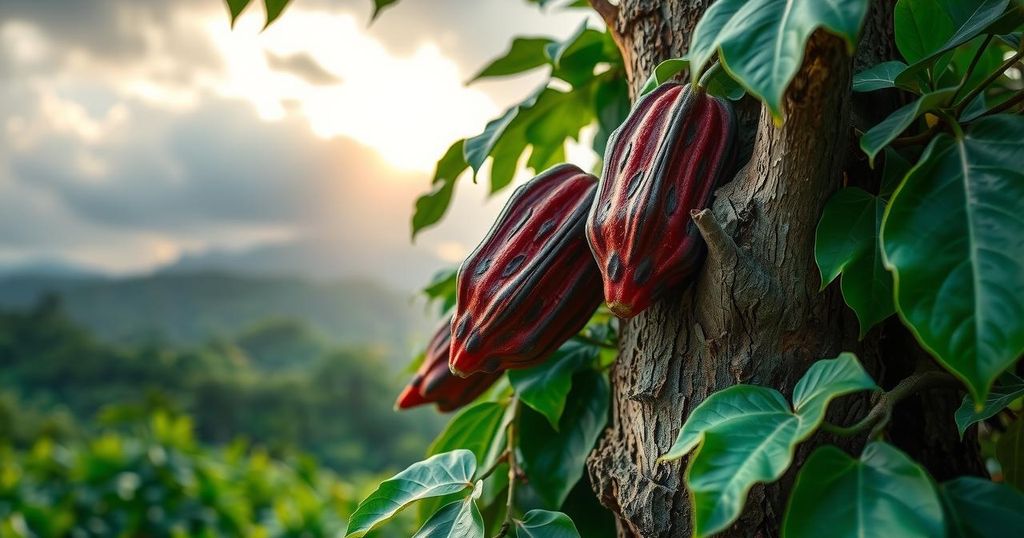Climate change is severely impacting chocolate production, especially in West Africa, which produces 70% of the world’s cacao. Unfavorable weather and rising temperatures have resulted in decreased harvests and increased cocoa prices. Reports indicate a worrying trend of drought and excessive heat affecting key cacao-producing nations like Ivory Coast and Ghana, threatening both the industry and the livelihoods of farmers.
Scientists have raised alarms about the impact of climate change on chocolate production, particularly in West Africa, which is responsible for 70% of global cacao supply. The region experienced extreme temperatures and unfavorable weather last year, affecting harvests and contributing to higher cocoa prices. A report from Climate Central indicates that the temperature trends, exacerbated by climate change due to fossil fuel use, are significantly impacting cacao-producing nations like Ivory Coast and Ghana.
The report assessed temperature data from 44 cacao-growing regions in West Africa, revealing that climate change has led to a notable increase in days exceeding 32 degrees Celsius, which is detrimental to cacao trees. In the past decade, Ivory Coast and Ghana have seen an increase of three weeks of high temperatures during the growing season. Last year, global temperatures reached historic highs, resulting in over 42 days of excessive heat in many analyzed areas, which researchers warn could reduce both the quality and quantity of cacao harvests.
In addition to the climate crisis, cacao production faces challenges from pest infestations, unpredictable rainfall, and economic factors such as illegal mining and smuggling. Christian Aid has highlighted the precarious situation for cocoa farmers, emphasizing that climate change is jeopardizing the livelihoods of many vulnerable populations in West Africa. Conditions have fluctuated sharply, alternating between severe rainfall and droughts, leading to failed harvests and exacerbated prices in the cocoa market.
The rising prices of cocoa have been significant, with New York markets reporting prices exceeding US$10,000 per tonne, a stark rise from the historical prices of US$2,000 to US$3,000 per tonne. Major chocolate manufacturers like Lindt & Spruengli are responding to these economic pressures by increasing their prices. Furthermore, experts emphasize that the problem of aridity in cacao-growing regions poses an existential threat not only to the chocolate industry but also to global ecological sustainability.
In addressing these issues, Professor Narcisa Pricope noted that over three-quarters of the world’s land has experienced increased dryness over the past three decades. She pointed to greenhouse gas emissions as a primary cause, alongside land degradation practices. “Collective action against aridity isn’t just about saving chocolate – it’s about preserving the planet’s capacity to sustain life” – Narcisa Pricope.
In conclusion, the report emphasizes that climate change poses a significant threat to cacao production in West Africa, with rising temperatures adversely affecting harvest quality and quantity. The ripple effects are seen in skyrocketing cocoa prices and the livelihoods of farmers. Addressing the broader implications of climate change is essential not only for the chocolate industry but also for global ecological stability.
Original Source: www.straitstimes.com






